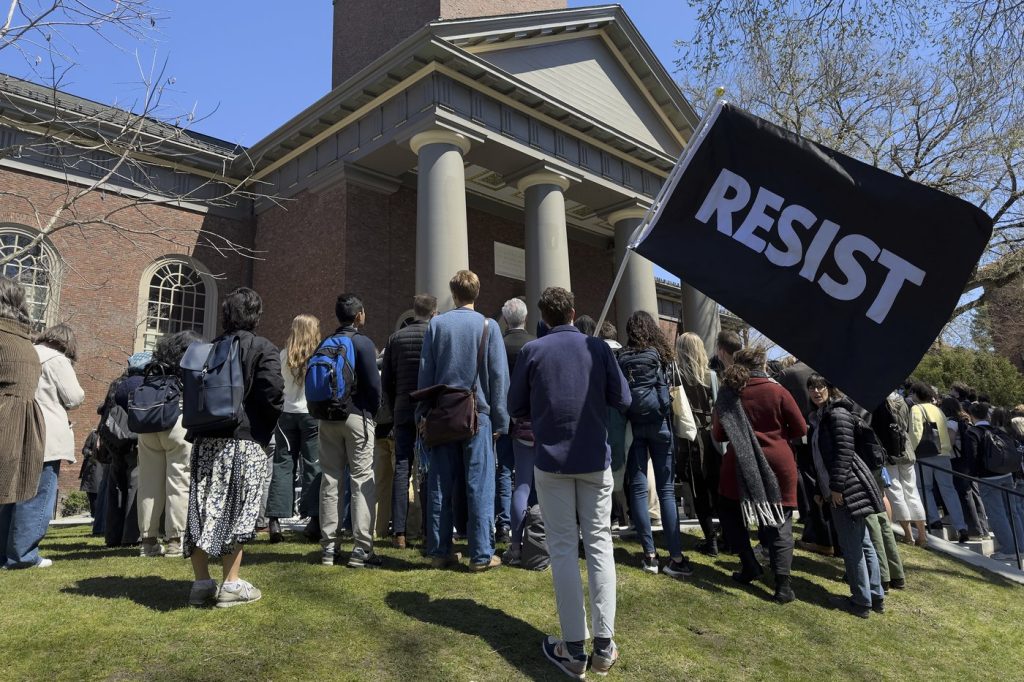BOSTON (AP) — Harvard University announced on Monday that it has filed a lawsuit to challenge a federal freeze on over $2.2 billion in grants. The university's action came after it stated its intention to defy demands from the Trump administration to limit activism on campus.
In an April 11 letter to Harvard, the Trump administration called for comprehensive reforms in governance and leadership at the university, as well as changes to its admissions policies. The administration’s request also included an audit of diverse viewpoints on campus and a halt to the recognition of specific student clubs. The government argued that universities have failed to address antisemitism that has emerged during campus protests relating to Israel's war in Gaza.
Harvard President Alan Garber affirmed that the university would not succumb to the administration’s demands. Shortly after, the government imposed a freeze on billions of dollars in federal funding that supports various research initiatives.
The lawsuit filed in Boston federal court argues that there is "no rational connection" between the concerns regarding antisemitism and the medical, scientific, and technological research affected by the funding freeze, which aims to promote American safety and leadership in global innovation. The suit highlights the significant adverse consequences the indefinite freeze could have on Harvard’s research programs, their beneficiaries, and the overarching national interest.
Harvard's lawsuit described the funding freeze as “arbitrary and capricious,” claiming it violates the university's First Amendment rights as well as statutory provisions of Title VI of the Civil Rights Act.
In response, the White House condemned Harvard's stance. Harrison Fields, a spokesperson for the White House, criticized the university for allegedly enriching its “grossly overpaid bureaucrats” with taxpayer money, emphasizing that federal funds are a privilege that Harvard has not earned under the current circumstances.
For the Trump administration, this situation with Harvard marks a significant challenge in its broader agenda to enforce changes at universities perceived as breeding grounds for liberal ideology and antisemitism. The administration aims to leverage the funding freeze to necessitate compliance with its demands, which include stricter discipline on campus protests and screening international students for values aligned with American ideals.
In its correspondence, the administration suggested that Harvard should enforce stronger measures against protesters and conduct audits of its faculty and student body to ensure a diverse range of viewpoints within each department. Harvard responded last week by asserting its commitment to the First Amendment, declaring that it would not comply with the government’s requests. Following this, Trump expressed on his Truth Social platform that the university might face loss of its tax-exempt status if it continued to promote ideologies he finds objectionable.
This lawsuit follows another legal action initiated earlier this month by the American Association of University Professors, which seeks a federal ruling to invalidate an ongoing investigation into Harvard's funding.
Harvard posits that the demands made by the government threaten not only its institution but also the autonomy that the Supreme Court has traditionally afforded American universities. President Garber reinforced this notion in a message to the Harvard community, reiterating the institution’s dedication to the values of higher education that have made it a global leader.
Alumni, including Anurima Bhargava, have commended Harvard’s decision to challenge the administration's actions. She described the government's approach as reckless and unlawful, emphasizing the detrimental impact on essential research funding that contributes to public health and societal progress.
The American Council on Education, representing over 1,600 institutions, also expressed support for Harvard. Ted Mitchell, the council's president, stated that the administration's actions violate due process and the rule of law, commending Harvard for its proactive stance and expressing hope for a clear judicial rebuke against actions that undermine academic integrity and research.












